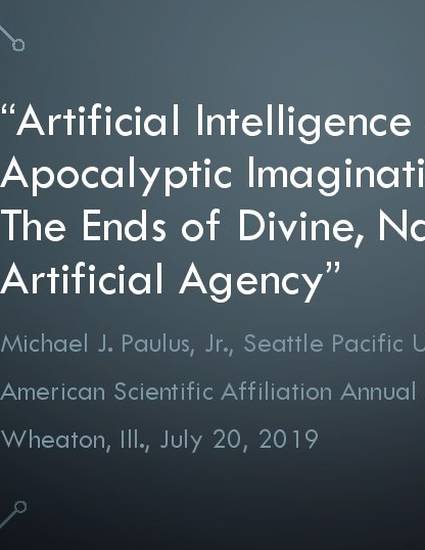
Presentation
Artificial Intelligence and the Apocalyptic Imagination: The Ends of Divine, Natural, and Artificial Agency
American Scientific Affiliation Annual Meeting
(2019)
Abstract
New information and communication technologies (ICTs) are reshaping our lives and the environments in which we live to such an extent that philosopher Luciano Floridi claims we are living through an information revolution. ICTs are changing our self-understanding, how we relate to each other, and how we understand our role in the world. At the center of this revolution is the advent of automated information processing and intelligent systems.
These technologies of artificial intelligence (AI) raise questions about data collection, algorithmic agency, and the future of every dimension of life. They also inspire a range of hopes and fears. Some AI narratives are optimistic and utopian, anticipating AI to solve known problems and create a superior form of life. Others are pessimistic and dystopian, expecting AI to exacerbate old problems and create new ones. The most extreme anticipations and anxieties include apocalyptic visions of an earthly paradise, posthuman immortality, and the end of the human species and human civilization.
Eschatological narratives about AI often draw from Judeo-Christian apocalyptic categories, and therefore present us with an opportunity for a deeper engagement with the apocalyptic imagination as we reflect on hopes and fears associated with our information revolution. This presentation explores how the Christian apocalyptic imagination provides a constructive conceptual and narrative framework for viewing our current information revolution as an information revelation about divine, natural, and artificial agency participating in new creation.
Disciplines
Publication Date
July 20, 2019
Location
Wheaton, Ill.
Citation Information
Michael J. Paulus. "Artificial Intelligence and the Apocalyptic Imagination: The Ends of Divine, Natural, and Artificial Agency" American Scientific Affiliation Annual Meeting (2019) Available at: http://works.bepress.com/michael_paulus/61/
